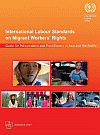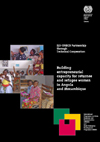Publications on labour migration
May 2007
-
International Migration Papers No. 89
Towards effective temporary worker programs: Issues and challenges in industrial countries
02 May 2007
April 2007
-
International Migration Papers No. 86
Discrimination in employment against second-generation Swedes of immigrant origin
25 April 2007
-
International Migration Papers No. 85
Discrimination in access to employment on grounds of foreign origin in France: A national survey of discrimination based on the testing methodology of the ILO.
18 April 2007
-
Publication
World Publics Welcome Global Trade - but not Immigration
10 April 2007
This document reports on the result of a global attitude survey that was carried out in 47 countries with more than 45,000 people by the Pew Research Centre Global Attitudes Project. The survey found that the publics of the world broadly embrace key tenets of economic globalization but fear the disruptions and downsides of participating in the global economy. It also reports that globalization is only one of several wide-ranging social and economic forces that are rapidly reshaping the world
-

Publication
Can the European social model survive? Is flexicurity the answer?
02 April 2007
The search for a better combination of flexibility and security is a major challenge within the European Union, and not only in the accession countries. Two major new studies from the ILO look at different aspects of employment and working conditions.
January 2007
-

Publication
International labour standards on migrant workers' rights: Guide for policymakers and practitioners in Asia and the Pacific
01 January 2007
An update on the rights of migrant workers, including basic terms and concepts relating to migration, discrimination, the ILO, the role of international labour standards, mechanisms, and procedures to assist in implementation.
-
Publication
International Labour Standards on migrant workers' rights: Guide for policymakers and practitioners in Asia and the Pacific
01 January 2007
Serves as a reference guide explaining the rights of migrant workers from the vantage point of the migrant worker to policymakers and practitioners.
June 2006
-

Publication
Building entrepreneurial capacity for returnee and refugee women in Angola and Mozambique
01 June 2006
ILO-UNHCR Partnership through Technical Cooperation
May 2006
-
Publication
Labour migration policy and management: Training modules
31 May 2006
Workers in the Asian region are increasingly mobile, posing immense challenges and opportunities for the growth and development of countries of the whole region. If properly managed, with due respect for the rights of migrant workers, the cross-border movement of labour can contribute significantly to the continued dynamism of the regional economies. With these opportunities in mind, a Resolution on a rights-based approach to managing migration was adopted at the International Labour Conference in 2004. This manual presents the framework provided by the Resolution for discussing migration issues and identifying good practices. The training materials include 10 modules that cover the main topics in global and regional migration to further contribute to the strengthening of labour migration management in the subregion.
-

Publication
Saving Lives, Protecting Jobs - International HIV/AIDS Workplace Education Programme - SHARE: Strategic HIV/AIDS Responses by Enterprises
01 May 2006
The US Department of Labour joined forces with the ILO early on to back this initiative, supporting workplace education programmes through a project called the Strategic HIV/AIDS Responses by Enterprises (SHARE). Today this project supports work in 23 countries reaching about 300,000 workers in some 300 enterprises. This report tells the story of SHARE and brings you the experiences of some of the people directly affected. SHARE aims to: Reduce employment-related discrimination against persons living with HIV/AIDS; Reduce risk behaviours among workers; Facilitate access to treatment, care and support; Maintain employment of workers living with HIV/AIDS in the targeted enterprises.